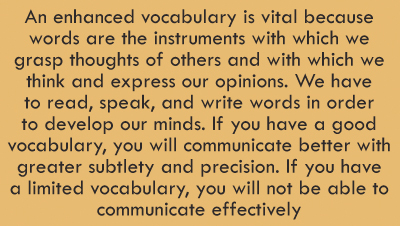
Many of us have forgotten the fact that success in almost any field goes hand in hand with the number of words you know – and that is a number that anyone can boost. In the Government schools most students pay less attention to English than other subjects. As a teacher, I found that some of them do not even bring their English textbooks to the class. As the books are given free they do not pay much attention to them.
The biggest problem faced by students is their unwillingness to learn new words and how to use them. Those who have had their education in the English medium did not have such a difficulty as they studied all the subjects in the English medium they enriched their vocabulary. When English was dethroned many generations of students did not want to learn English in a serious way.
The problem is not confined to Sri Lanka. Even in developed countries some students do not have a good vocabulary to complete their studies. Some of them fail to enter the Medical Faculty of a university because of their poor vocabulary. At the Human Engineering Laboratory in Boston which tests students for aptitudes and word knowledge, some of them scored very low marks.
Evidence
There is evidence to show that if you have a good vocabulary, you will do better in any field such as science, engineering or management. What is noteworthy is that vocabulary can be learned easily today as there are so many books to help learners. When we were students we used the Johnson O’Connor Vocabulary Builder which listed words in order of difficulty. The book gave half-page definitions and explanation for each word. Although this book may not be available today, there are many other books that will help you to increase your vocabulary. Some of them are Roget’s Thesaurus of Words for Intellectuals,TheBig Book of Words You Should Know, and The Words You Should Know to Sound Smart.
 Another way to enrich your vocabulary is to read books, magazines, and newspapers, looking up the meaning of every unfamiliar word and noting it in a notebook which should be consulted whenever possible. I still copy new words and their meanings in my journal. To do this effectively you should be a lover of words. As a journalist I love words immensely.
Another way to enrich your vocabulary is to read books, magazines, and newspapers, looking up the meaning of every unfamiliar word and noting it in a notebook which should be consulted whenever possible. I still copy new words and their meanings in my journal. To do this effectively you should be a lover of words. As a journalist I love words immensely.
The close relationship of vocabulary and learning any subject well was established some years ago by Johnson O’Connor who was a little man with a Vandyke beard and a vast word-hoard enunciated in a crisp Boston accent. As the founder of the Human Engineering Laboratories, he came upon the discovery almost by accident while testing some 100 vice presidents of Eastman Kodak, General Motors, General Electric and other large corporations. To his amazement, they showed a wider knowledge of words than any other group he had ever tested, including university professors, lawyers, and doctors. My association with some modern-day professors and lecturers proved that their vocabulary was limited.
High achievers
O’Connor examined thousands of people and found that achievers in any field scored high in vocabulary. It is true that most musicians, actors and other entertainers do not have an above average store of words. However, there are some well-known composers and conductors who are verbally competent. Similarly, with a few exceptions, physicists, chemists and mathematicians are usually not presumed to require superior verbal fluency. According to O’Connor, aptitudes point the way that one should take while vocabulary determines how far you will go.
An enhanced vocabulary is vital because words are the instruments with which we grasp thoughts of others and with which we think and express our opinions. We have to read, speak, and write words in order to develop our minds. If you have a good vocabulary, you will communicate better with greater subtlety and precision. If you have a limited vocabulary, you will not be able to communicate effectively.
I quit my pensionable government job which did not require me to use many words. I wanted to do a job in which I could use words. I found that only journalists, authors and teachers of literature use a large number of words in their professions. If you happen to be doing such a job, you will realise the need for a bigger vocabulary. The natural way to have a bigger vocabulary is to widen your interests. For instance, a six-year-old child is curious about everything. He will ask thousands of questions. Therefore, he can learn at least 5,000 new words within a year. When he becomes an adult, his curiosity gets blunted. He becomes satisfied with learning only a few subjects. Such a person will not learn even 150 new words a year. If you want to boost your vocabulary, take an interest in literature, international affairs, psychology, philosophy and science.
If you commit a dictionary to memory, will you be a better person? In fact, there was a student in my class who wanted to do it. He memorised a few pages of a dictionary and gave it up. O’Connor thinks that it is not a silly idea to commit a dictionary to memory. There is a saying, ‘What’s learned with pleasure is learned full measure.’ There is no difference between a vocabulary you get by bone-hard work and one which some people seem to have come by effortlessly. Of course, it is not practicable to memorise all the words in a dictionary. Instead you can read the dictionary at regular intervals to be familiar with the words and their meanings.
Memory
Another way to increase your vocabulary is to learn the basic root words that make up the language. When you learn the meaning of one word you pick up several more in the process. The term ‘economy,’ for example, is a nucleus around which the cluster ‘economise, economics, economist, economy’ and ‘economical have been formed’. Linguists call them word families. Instead of learning the meaning of one word, learn the meaning of all the other words in the family. This will ensure rapid results in enriching your vocabulary.
From my young days I used to read the Reader’s Digest feature It pays to enrich your word power. It usually gives 20 words at a time in a word-quiz. If you learn those words and the meanings, you will be doing a great service to yourself. I usually learn a new word a day and I am sure it would triple the usual accumulation. One way to remember new words is to use them in sentences. If you are going to be a writer, such words will help you to express your ideas clearly.
There are many vocabulary building books that will speed up the process. Among them you will find Norman Lewis’s Word Power Made Easy and Peter Funk’s How to increase your word power. Acquiring a substantial number of new words is not easy but it is not impossible. What you need is a great love for the language. As you grow old you will realise that a rich vocabulary is an invaluable resource like courage and integrity, ready to help you in times of need.
